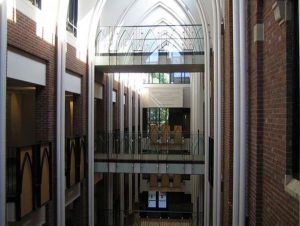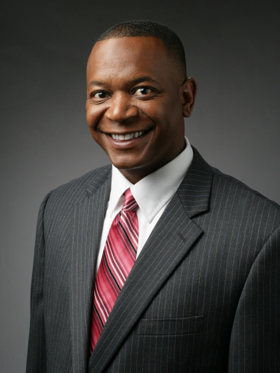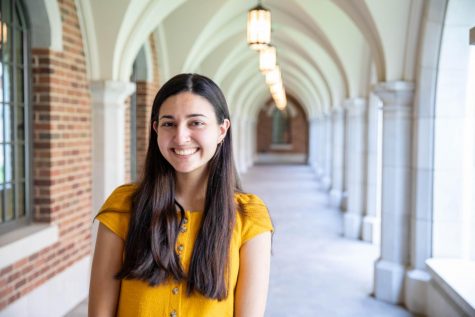This fall, the College of Arts and Science welcomes Dr. André Christie-Mizell as its new Senior Associate Dean of Undergraduate Education.
Among the first of his major tasks was to oversee the move of the undergraduate deans office from Kirkland Hall, which houses the bulk of the school’s administrators, to Buttrick Hall, which houses many of the classes in the College of Arts and Science. The office was moved from Kirkland to Buttrick so that it could expand and be more accessible to students.
“Being here in Buttrick makes us more central,” Christie-Mizell said. “There are classrooms on our floor–students are just here, it’s easy to just stop by. We would hear students before talk about having to make a plan to go over to Kirkland, but if you’re coming out of Rand or if you’re coming from the library, right here is Buttrick. I think it’s a more student-friendly location.”
Christie-Mizell emphasized that he wants the office to be a welcoming place for students.
“A student might have questions about their long-term future, about their plans, and maybe we’re not the right place for them to come talk to, but we can help them find the right adviser to go to or the right tutoring services to go to… There’s a lot of collective experience in this office, and I want students to know that we’re here and to take advantage of it.”
Like others in similar positions, Christie-Mizell, a sociology professor, was selected from the faculty. Christie-Mizell has been on several university-wide committees, including his position as the chair of the multicultural university courses committee this past spring.
Christie-Mizell will still be teaching and doing sociology research in his new role. He teaches a graduate course in statistics on Mondays and Wednesdays, and does research on Thursdays. However, he can still be reached to meet then, too.
”It’s kind of a special position I have, where I’m lucky I’m able to do both,” Christie-Mizell said.

As Senior Associate Dean, Christie-Mizell works with his fellow associate deans to oversee a variety of functions including curriculum, the implementation of Achieving Excellence in Liberal Education (AXLE), College of Arts and Science Pre-major Academic Advising Resources (CASPAR) and tutoring services, while also addressing individual student’s concerns. He also meets regularly with the Dean of the College of Arts and Science, Lauren Benton, and Vice Provost for Learning and Residential Affairs, Cynthia Cyrus, to work on these issues.
“I often joke that what I really am is the dean of meetings,” Christie-Mizell said.“One thing I love about the position is that there’s never a dull moment. There’s always something to do, somewhere to be, some issue, program, or project to be talking about. Often times people say the thing that makes you the happiest is also the thing that stresses you out, so I’m also sometimes stressed out because there’s a lot to do and I have to in five minutes be at a meeting across campus, but I don’t think I would trade it. It’s a very interesting and vibrant position to be in.”
Christie-Mizell outlined three major goals he has for this year. His first goal is to balance both firm rules with flexibility. While he wants to be consistent with every student, he also wants to make sure individual needs are addressed on a personal basis.
“I want students to be certain when they come through that door if they have a special case, a special need, a petition, that they understand and know they are going to get the same treatment as any other student. So if the answer is no to student A, then the answer is no to student B. But I also want the flexibility to make sure when possible and when fair that we also think about the individual.”
He gave an example of this in this year’s extension of a grace period to drop/add for people who came in with a specific reason, such as illness.
On a more institutional level, Christie-Mizell hopes to have a smooth transition to the new Buttrick office, further from other administrative offices in Kirkland.
“I want us to make sure that we have this new identity where we’re among the students,” Christie-Mizell said. “But I also want to make sure that we are still the dean’s office, that we still are able to maintain our connection to the greater administration.”
I want us to make sure that we have this new identity where we’re among the students.
-Dr. Christie-Mizell, Senior Associate Dean of Undergraduate Education
Christie-Mizell also wants to focus on developing the Immersion Vanderbilt initiative this year. Immersion Vanderbilt is designed to incentivize students to take advantage of opportunities that may not obviously fit into their course load. These include internships, study abroad, research and other unique experiences by giving course credit for the completion of an immersion experience.
“Let’s say you’re an engineering student,” Christie-Mizell said. “Being an engineering student might not give you as much time as you want to pursue your love of art. But maybe as your immersion experience, you would do an art installation. So it would give you an opportunity to get credit for and do something that in your regular course of study you might not necessarily be able to do.”
Christie-Mizell pointed out that college is a time for soul-searching for a lot of students, and that kind of exploration is something the undergraduate deans hope to facilitate.


